Public Health Global Challenge Conference, April 2015
Dr Sebastiana Kalula participated in the 2015 Public Health Global Challenge Conference of the World University Network (WUN) on “Healthy Ageing – Researching a Life Course Approach,” held at the Chinese University of Hong Kong, Hong Kong on April 25-30, 2015. WUN is a leading global higher education and research network, and recently listed ageing as a global challenge. A platform was created in the conference for collaborative research in this field.
4th Berlin Demography Forum, March 2015
Dr Sebastiana Kalula participated in the 4th Berlin Demography Forum held in Berlin, Germany on March 18-20, 2015. The theme of the forum was “Activity – Health – Participation." She was a panelist in a discussion on “A Global Comparison on Healthy Aging” convened by Dr Ursula Staudinger and Dr Axel Borsch-Supan, the Presidents of ILC USA and ILC Germany, respectively. The panel discussion formed part of an ongoing multi-centre project investigating the "Health Effects of Retirement” in ILC Global Alliance participating countries. The project aims to shed light on the impact of age at retirement on health in the countries. Information on the project’s activities and members is available at online.
Almost 700 million people are now over the age of 60. By 2050, 2 billion people, over 20 per cent of the world’s population, will be 60 or older. The increase in the number of older people will be the greatest and the most rapid in the developing world, with Asia as the region with the largest number of older persons, and Africa facing the largest proportionate growth.
25th International Day of Older Persons
The 2015 celebration of the 25th anniversary of International Day of Older Persons (IDOP), in anticipation of the third United Nations Conference on Housing and Sustainable Urban Development (Habitat III) to be held in 2016, will focus not only on the impact of the new urban environment on older persons, but also the impact of older persons on the new urban environment.
Already, the move of people worldwide to cities is happening at a record pace, with 6 out of every 10 people in the world expected to reside in urban areas by 2030. Consistent with the phenomenon of urbanization, the number of older persons is increasing most rapidly in urban areas of developing countries. The combined effect of both phenomena means that the number of people over 60 living in cities may grow to over 900 million by 2050 – making up a quarter of the total urban population in developing countries.
In principle, these trends offer older persons prospects for improving their quality of life. Well planned cities are more likely to provide income generating and education opportunities, in addition to housing and urban environments that are more accessible and safe for older persons, including the incorporation of age-friendly features in public facilities. This includes access to affordable, reliable, safe and physically accessible transportation, which is one of the cornerstones of older persons’ participation, independence and social inclusion.
Secretary-General's Message for 2015
On the 25th anniversary of the International Day of Older Persons, we recognize that older persons are an enormous asset to society and make a significant contribution to global development.
On September 25 at United Nations Headquarters in New York, Heads of State and governments committed themselves to building a sustainable world where no one, regardless of their age or gender, is left behind. In implementing the newly adopted 2030 Agenda for Sustainable Development, we must account for the demographic changes of the next 15 years. These will have a direct bearing on the achievement of the Sustainable Development Goals.
Rapid population ageing and urbanization will increasingly shape our societies. The number of people aged 60 years and above living in cities is projected to grow to more than 900 million by 2050. This will comprise a quarter of the total urban population in developing countries.
The theme of this year’s International Day of Older Persons -- “Sustainability and age inclusiveness in the urban environment” -- highlights the need to make cities inclusive for people of all ages. The United Nations Conference on Housing and Sustainable Urban Development (Habitat III) to be held in Quito in October 2016 offers an opportunity to advance this effort.
Making cities inclusive of older persons means generating opportunities for their economic and social participation in accessible and safe environments. It also means providing affordable housing as well as the health and social services needed to support ageing in place.
On this International Day of Older Persons, I call on Governments to make cities and human settlements inclusive, safe, resilient and sustainable so that no one - of any age - is left behind.
interRAI WEBINAR – Tuesday 14 July 2015
The IAA and ILC SA hosted a webinar to introduce colleagues to interRAI tools. interRAI has developed instruments for comprehensive assessment of function, mental health, cognition and physical health of people across the continuum of care. The webinar was aimed at professionals, practitioners and researchers in the health sciences and the social sciences who have an interest in research on and care of older persons.
InterRAI is a collaborative network of researchers in over 30 countries committed to improving care for persons who are disabled or medically complex. The consortium strives to promote evidence-informed clinical practice and policy decision making through the collection and interpretation of high-quality data about the characteristics and outcomes of persons served across a variety of health and social services settings.
The three presenters in the webinar were:
Brant Fries, a professor of health management and policy at the School of Public Health and a research professor in the Institute of Gerontology, University of Michigan, Ann Arbor, Michigan, USA, and chief of health systems research for the Geriatric Research, Education, and Clinical Center at the Ann Arbor VA Medical Center.
Dr Fries founded and is the President of interRAI. He co-authored interRAI’s assessment systems for community-based elders, acute care and long-term mental institutions, palliative care, intellectual disabilities, and correctional facilities. He is the author of 23 books and over 140 articles on long-term care and quantitative modelling of health care systems.
Anja Declercq, who has a degree in applied economics and in sociology, and a PhD in social sciences. She is currently a professor in the Faculty of Social Sciences of the Catholic University Leuven in Belgium and a project manager at Lucas, an interdisciplinary research institute at that university. Her research focuses on care for elderly people in terms of innovation and quality improvement.
John Hirdes, a professor and chair of the Ontario Home Care Research and Knowledge Exchange at the School of Public Health and Health Systems, University of Waterloo, Ontario, Canada. He is the senior Canadian Fellow and a board member of interRAI. He chairs the inteRAI Network of Excellence in Mental Health (iNEMH)and the interRAI Network of Canada, a collaborative network of researchers and graduate students from across Canada.
Dr Hirdes has over 130 publications in peer-reviewed journals and academic book chapters. His primary areas of interest include geriatric assessment, mental health, health care and service delivery, case-mix systems, quality, health information management, social determinants of health, and quantitative research methods.
Second World Congress on Healthy Ageing: July 30 – August 2, 2015
The Second World Congress on Healthy Ageing with the theme “Bridging the Ageing Divide” is to be held in the Sandton Convention Centre, Johannesburg, South Africa on July 30 – August 2, 2015. Dr Kalula will participate in a panel discussion entitled “Understanding the Law and Ageing, and how to Protect the Elderly”.
ILC South Africa Associate Jaco Hoffman Co-director
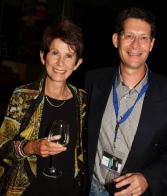
Former ILCSA Associate Jaco Hoffman returned to South Africa at the end of 2014 from a 10-year stay at Oxford University in the UK, where he continues to hold the position of James Martin Senior Research Fellow in the Oxford Institute of Population Ageing. Jaco has worked in the field of ageing for more than two decades: nationally, regionally and globally. He has been appointed as Research Professor and head of the Optentia Research Focus Area: Ageing and Generational Dynamics in Africa at North-West University’s Vanderbijlpark campus, outside Johannesburg. An inter-institutional partnership has been entered between North-West University and the University of Cape Town whereby ILC South Africa is now hosted and operated jointly on the two campuses. Under the partnership, Jaco Hoffman and Sebastiana Kalula are Co-Directors of ILCSA.
Photo: Former ILCSA President Monica Ferreira and Jaco Hoffman at the opening of a "Celebrating Care" conference in Stellenbosch in October 2014
ILCSA co-hosted a seminar on quality of care and health standards in long-term care
In a seminar on "Quality of care and health standards in long-term care" co-hosted by ILCSA and the IAA in November 2011, Dr John Morris (Boston, USA) outlined his work on the development of quality indicators for comprehensive assessment of long term care, and functioning, cognition and clinical conditions of residents, as part of the interRAI collaboration. interRAI is a network of researchers in over 30 countries committed to improving health care for persons who are elderly, frail or disabled. Dr Morris was the Task Leader for the federally mandated CMS project to develop the nursing home minimum data set (MDS) and resident Assessment Protocols, as well as Principal Investigator in the development of the MDS Version 2.0. He co-authored the RAI-HC system for evaluating the needs, strengths and preferences of elderly clients of home care agencies, as well as the RAI system for post-acute care. Morris chairs the Instrumentation System Development Committee, and with ISD committee members led the development of the interRAI Clinical Assessment Protocols (CAPS) for use in a variety of settings.
Dr Morris is based in the Institute for Ageing Research, Hebrew Senior Life at Boston and Harvard Medical School. Download Dr Morris PowerPoint presentation.
ILCSA president Monica Ferreira gave the keynote speech at the 10th Anniversary Celebrations of GAPA
The NGO Grandmothers Against Poverty and AIDS (GAPA) celebrated the 10th Anniversary of its inception on October 20, 2011. GAPA was started in Khayelitsha, a sprawling township outside Cape Town, in 2001, following a research and intervention project conducted by Monica Ferreira and colleagues at the Institute of Ageing in Africa. The project identified problems the grandmothers experience in caring for adult children and grandchildren infected with the HI virus or affected by AIDS, and their support needs. The model the investigators subsequently developed and which is implemented supports and empowers the grandmothers to cope physically, emotionally and financially.
Grandmothers participate in income generating activities, such as sewing, craft making and food gardening, and life skills training, and benefit from peer support, counselling and health education. The model includes smaller peer support groups with a grandmother as a leader, and has been expanded to include a bursary scheme to send young grandchildren to crèche and an after-school care centre for school-going grandchildren, both which offer the grandmothers some respite and foster child development.
A best practice, GAPA has drawn the interest of persons and groups worldwide. Its model is replicated in other townships and provinces, and in certain neighbouring African countries. GAPA is currently managed by director Vivienne Budaza.
In her speech, Monica Ferreira congratulated GAPA grandmothers and managers on the auspicious occasion, and referred to the increasing incidence of HIV and AIDS in older people. She encouraged the grandmothers to be tested for AIDS and to insist on anti-retroviral treatment if diagnosed as HIV positive. She also encouraged them to become better informed of their rights and to exercise their rights. Ferreira's speech; GAPA anniversary photos.
ILCSA with the IAA and several partners to hosted the 1st IAGG Africa Region Conference on Gerontology and Geriatrics
A Conference with the theme "Ageing Africa: Beyond Madrid+10" was held in Cape Town on October 17-20, 2012, convened by the International Association of Gerontology and Geriatrics (IAGG) Africa Region (Dr Isabella Aboderin is the conference convenor) and several partner organisations. The Institute of Ageing in Africa and ILCSA, together with UCT's Conference Management Centre were local organisers of the conference. A key objective of the conference was to appraise progress in the implementation of the UN Madrid International Plan of Action on Ageing (MIPAA) and the African Union Policy Framework and Plan of Action on Ageing in Africa, ten years after governments adopted the plans.
ILCSA staff and associates participated in the NANHRI conference on human rights and older persons
Sebastiana Kalula and Monica Ferreira at ILCSA, and ILCSA associate Dr Isabella Aboderin participated in the 8th Biennial Conference of African National Human Rights Institutions (NANHRI), in Cape Town on October 19-21, 2011. The theme of the conference, organised by the South African Human Rights Commission (SAHRC), was "Advancing the human rights of older persons and persons with disabilities - the role of African national human rights institutions." Dr Aboderin gave a key introductory address in the conference, entitled "Setting the scene - older persons in Africa."
The conference focused on the role of national human rights institutions and state bodies in strengthening the promotion and protection of the rights of older persons and persons with disabilities. It was attended by chairpersons of these institutions in Africa, the OHCHR, UN experts, representatives of civil society organisations, academics and experts working in the fields of these vulnerable persons. The conference aimed to reach a consensus on the role of the institutions in the promotion and protection of these people's rights, and to this end drafted and adopted a Cape Town Declaration.
ILCSA participates in an ILC Global Alliance conference on integrated care for frail older people
The theme for the one-day ILC conference convened by the ILC Global Alliance in Leyden, the Netherlands, to coincide with the Alliance's board meetings in September 2011, was "Integrated care for frail older people." A number of Dutch experts read papers on frail care policy responses in the Netherlands. Co-President Sally Greengross presented a composite paper of contributions of ILC partners on this topic.
Professor Rudi Westendorp, director of the Leyden Academy on Vitality and Ageing, and a board member of ILC the Netherlands delivered the 2nd Robert Butler Memorial Lecture, entitled "The frail elderly in the Netherlands," in the conference. Download Westendorp's PowerPoint presentation (7.83 mb).
Ma Sisulu, stalwart activist in South Africa's liberation struggle, died at her home at the age of 92
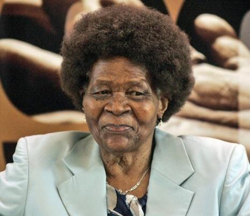
Albertina Sisulu, wife of the late activist Walter Sisulu and herself a stalwart in the country's liberation struggle, a revered "mother of the nation," passed away at her home in Johannesburg on June 3, 2011. She was 92.
Walter Sisulu died in 2003. In the same year, permission was obtained from the Sisulu family to rename the Institute of Ageing in Africa (IAA) to honour the couple's dignity, selfless service and leadership to the nation. We at ILCSA mourn her passing and are proud to honour her memory.
Ma Sisulu was a gracious, caring and compassionate woman, a committed health practitioner, and a loving wife and mother. Above all, she will be remembered for her dedication to unifying, transforming and instituting pride in the nursing profession, which became a pillar for the provision of quality healthcare worldwide. We will continue to work to improve the quality of health care for older persons, and to respect the legacy she and Tata Sisulu left us. Hamba khale, Mama
ILCSA director Sebastiana Kalula, participated in a South African Older Persons' Forum (SAOPF) dialogue with health minister, the Honourable Dr Aaron Motsoaledi
Sebastiana Kalula, a geriatrician, participated in a dialogue initiated by the South African Older Persons' Forum (SAOPF) with the Honourable Minister of Health, Dr Aaron Motsoaledi, in Pretoria in August 2011. The dialogue was aimed at the advancement of health care for older persons. The following issues and how they would be addressed were discussed:
- Amendments to the Older Persons Act and Regulations. The nursing staff ratio formula in the Regulations should be in line with the Regulations to the Nursing Act;
- Frail care services costing model. The 2005 costing model needs to be revised, with the Department of Health, and not the Department of Social Development, funding nursing staff in frail care units in residential care facilities in future;
- Monitoring of frail care units in residential care facilities. According to the Older Persons Act, the Department of Health does not have a mandate to monitor these facilities without the involvement of the Department of Social Development, and the health department will seek legal advice on the interpretation and amendment of the act;
- Older persons with HIV/AIDS. The Directorate: Chronic Diseases, Disabilities and Geriatrics has provided input to the National Strategic Plan on the special needs of older persons with HIV/AIDS and will seek to have special HIV/AIDS awareness materials developed for older persons.
ILCSA disseminated a research policy brief on supporting older caregivers to persons affected by HIV and AIDS
Research Policy Brief 01/10 on "Supporting older caregivers to persons affected by HIV and AIDS," prepared by former ILCSA senior researcher Dr George Petros, was been disseminated. The brief offers a policy framework for responses to the carers' care and support needs within the public health domain. The framework is based on evidence obtained in a large survey conducted by Dr Petros in three of South Africa's nine provinces. View the AIDS Policy brief.
ILCSA hosted the 2010 Annual Board Meetings of the ILC Global Alliance in Cape Town
ILCSA hosted the 2010 annual meetings of the ILC Global Alliance in Cape Town on 26-28 October. Representatives of ten of the 12 ILCs at the time, now 14, participated in the Board meeting, which was co-chaired by the incoming co-presidents, Baroness Sally Greengross and Monica Ferreira. Tribute was paid in the meeting to the late Dr Robert Butler, who passed away on July 4, 2010. Dr Butler was the founding Co-President of the Global Alliance, with Mr Shigeo Marioka (ILC Japan), and former CEO of ILC USA.
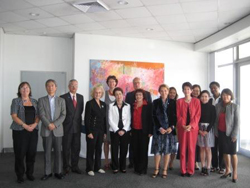
|
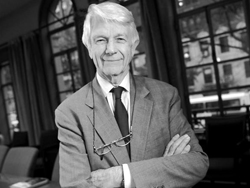
|
| ILC GA Board members | The late Dr Robert Butler |
ILCSA convenes a symposium on the globalisation of dementia
ILCSA convened a half-day international symposium to coincide with the annual meetings of the ILC Global Alliance, held in Cape Town in October 2010. The theme of the symposium was "The Globalisation of Dementia: Issues and Responses." Partners of all ILCs represented in the annual meetings gave papers, or participated in panel's input and discussion in the symposium. See the Dementia symposium programme.
Dr Marc Combrinck, a neurologist and recently appointed incumbent of the Chair of Geriatric Medicine within the IAA, delivered the 1st Robert Butler Memorial Lecture, entitled "Global demographic changes and the challenge of dementia" in the symposium. The lecture gave an overview of the state of knowledge of dementia and referred to HIV associated dementia in Africa. Download Dr Combrinck's PowerPoint presentation (13.5 mb).
Three key papers read in the symposium, penned by Sally-Marie Bamford and Sally Greengross (ILC-UK), Françoise Forette and Marie-Anne Brieu (ILC France) and Sebastiana Kalula and George Petros (ILCSA), together with an Forum article on integrated input of the panellists have been published in a special issue on dementia of Global Ageing: Issues and Action (7(1), August 2011). The special issue was guest edited by Monica Ferreira at ILCSA and Jill Adkins, an independent attorney in the USA, previously based in Cape Town. The issue includes an editorial, and a preamble to, and the Cape Town Declaration on a Global Response to Dementia. A copy of the special issue may be obtained from Greg Shaw at the International Federation of Ageing.
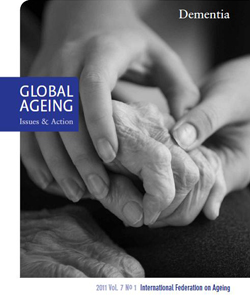
|
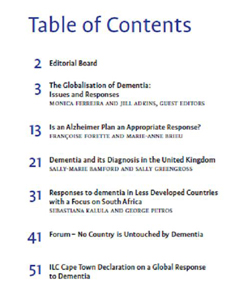
|
ILCSA co-ordinated the drafting and dissemination of the Cape Town Declaration on a Global Response to dementia.
The Cape Town Declaration on a Global Response to Dementia was drafted and adopted in the symposium, and later disseminated for comment. The Declaration is published in the special issue on dementia of the International Federation of Ageing's journal Global Ageing: Issues and Action (7(1), August 2011).
